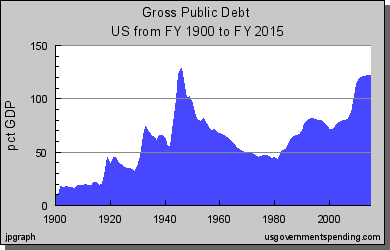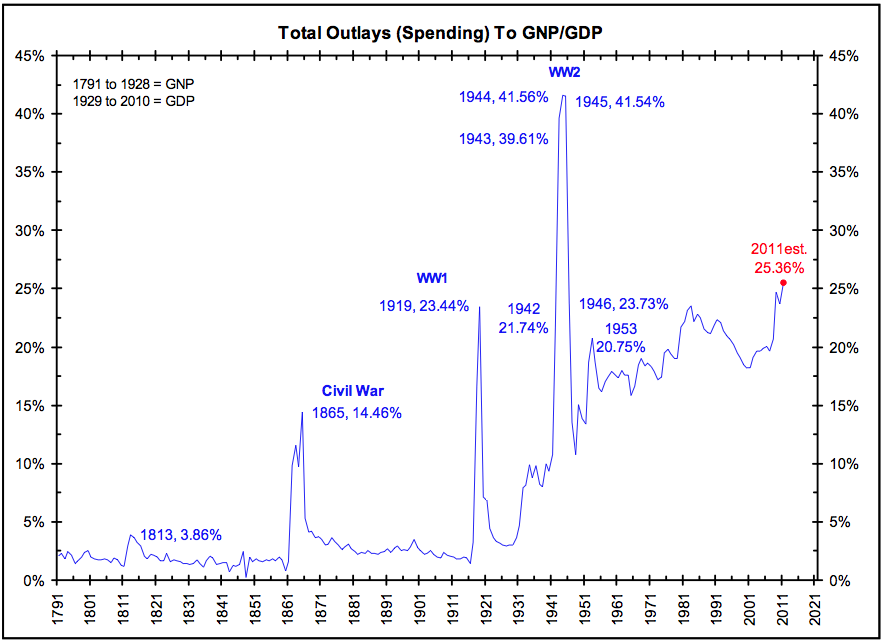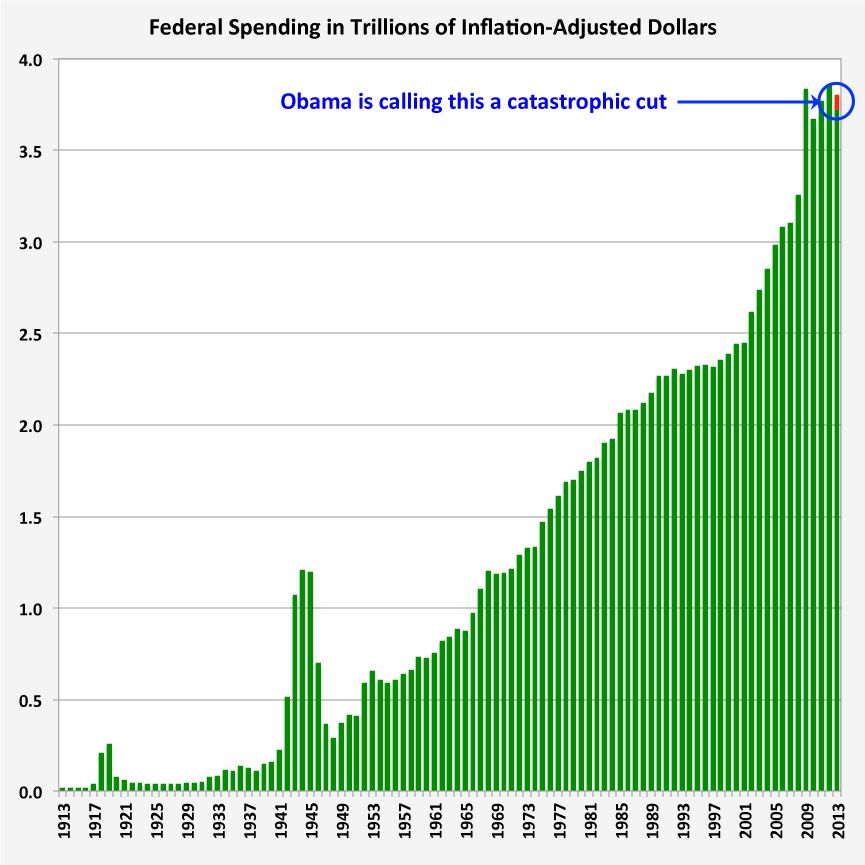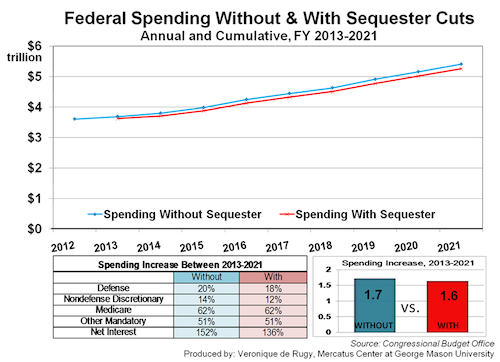All of the talk in Washington lately is regarding the “draconian” cuts to the budget from the sequester. The word “sequester” seems strange to most normal people, but the bottom line is that these were cuts made as part of the 2011 deal to raise the debt ceiling. The idea of a sequester came from the White House and was approved by Congress in case the feds couldn’t come up with a long-term debt deal.
For anybody with a historical perspective, the talk of “draconian” cuts is just crazy.
The U.S. federal government is spending more than it ever has. Check out this chart, which shows federal government debt:
Why is there so much debt? It is true that tax collections are down because of the overall down economy, but for anybody with eyes to see “it’s the spending, stupid.”
Looked at another way, here is the growth of government spending over time and the proposed cut.
So, will any government spending truly be cut with the “sequester?”
If you believe that, I have a missile silo I would like to sell you. Here is what happens to government spending under the sequester: it continues to go up (a lot) but not as fast.
Some of the opponents to the sequester have a point that there are probably better ways of cutting government spending. It is true that the sequester deal does not take on the biggest areas of out-of-control spending, ie, entitlements (Medicare, Social Security, Medicaid). But the president and most Democrats have basically declared entitlements off-limits. In that environment, the sequester cuts seem very sane and responsible indeed.






The real insanity is that the cuts are not a LOT more. We are driving right over the cliff and the only argument being seriously considered is whether we should drive over at 100 mph or 95 mph.
The debt problem will never be solved with just cuts in discretionary spending. Entitlements (non discretionary spendin) alone will devastatingly bankrupt the country in a few years.
The debt figures now in use do NOT include the present value of future obligations, ie what we need to have set aside for govt employee retirement and health care costs, and for the baby boomers who will be retiring soon. We still have another 10 years to go before all the baby boomers reitre. In fact, the “hump” of boomers hasn’t hit 65 yet.
We used to have a “Social Security Trust Fund”, but the fed govt “borrowed” from it, and put in an IOU, back when Reagan was president.
In reality, the debt is over 20 trillion.
We are going to have a disaster soon unless entitlements are completely restructured. And it is likely too late. Too many people have not saved for their retirement, hoping to rely on SS and Medicare alone.
So all this talk of budget cuts in discretionary spending is merely avoidance of the much bigger problem.
One problem (among many) with the sequester is that it does not actually accomplish what its proponents want it to. The likelihood is high that it will cause a reduction in the rate of growth in the economy (with a small but significant chance that it will actually tip us back into a recession) which will likely mean tax revenues will fall as a result. To the extent the sequester is a one-time shot and the impact to growth may be much longer term it is entirely possible (and from a purely economic analysis stand point actually quite likely) that the cumulative budget deficits of the next three years will be higher with the sequester than without it. That is just metaphorically cutting off your nose to spite your face. Not good or smart economic policy at all. One of the significant problems President Obama faces with respect to the budget and economy is that most of the Tea Party folks in Congress are apparently incapable of understanding the fundamental differences between Macro and Micro economics.
I do take issue with your description that the idea was proposed by the White House, the *defense cuts* were proposed by the White house as a bargaining chip in the debt ceiling debate, the other half of the cuts were proposed by the Congressional Republicans. Both parties at the time said the cuts would never happen, and both parties at the time voted for it.
John Swenson Harvey, sorry, cutting the government spurs economic growth. If cutting the government is bad for the economy, how do you explain the 1920s, the late 1940s and the 1990s, when we cut government (the only times we have done so) and the economy boomed in the years following? The Keynesian myth that government spending will lead to economic growth is, indeed, a myth. Putting money back in the pockets of consumers is what brings economic growth. People will always decide to spend their own money in ways that will bring the most economic growth in the most efficient manner. You can take your complaint on Obama to Bob Woodward, who says very clearly the whole idea of the sequester came from Obama.
I’ve read Woodward’s statement careful, his quoted source explicitly say defense cuts, and *he* then extends the argument to say the whole thing. In any event, both sides voted for the policy as a suicide pact to try to get to a compromise bill – which never happened.
The longest period of growth in a peace time economy for the US was under President Clinton’s terms in office. If you remember at the time the Republicans had a cow because he was able to get Congress to raise taxes at the start of his first term. Interesting how their (the republicans) view of history has evolved since then.
(Edited).
John Swenson Harvey, you need to do a bit more study and read more carefully. I praised the Clinton years, but growth did not really accelerate until after the 1994 Congress began cutting spending, which is exactly my point. In addition, Clinton cut capital gains taxes. The Fed also helped create the dot.com bubble, which resulted in the 2000 contraction. So, the Clinton years were a mixed bag in many ways, but I would easily trade the Obama Depression for the Clinton years given a choice. My larger point that cutting spending brings prosperity is proven true by the Clinton years.
In addition, the period of sharpest recent economic growth is the post-war period when Keynesians predicted disaster. Government spending was cut by 40 percent after the WWII demobilization. After a brief adjustment, the economy had sustained growth that fueled the prosperity of the 1950s.
You can read a bit about it here: http://en.wikipedia.org/wiki/List_of_economic_expansions_in_the_United_States
Bob Woodward said that the sequester was Obama’s idea. Own it.
And yes, until the Keynesians can explain the 20s, 50s, 60s (Kennedy slashed taxes), then they should shut up with their mindless droning drivel.
You are right that it is amazing. What is more amazing is that the Obama administration thinks it can fix the spending problem by raising taxes without any real cuts. Obama has gone on the stump to trumpet the effects of cutbacks to states. If he is to be believed, more than 10% of the total cuts come from Utah alone (I wouldn’t worry because the number is obviously wildly unreliable like almost all numbers coming out of the Obama administration). However, the gap cannot be closed only with spending cuts. The spending has been so irresponsible and profligate that tax increases are now inevitable unless we just drive over the cliff. Of course the increased taxes, if not done correctly, will have a negative revenue impact rather than a positive impact.
Blake, I can’t see any scenario where any tax increases will be acceptable (although tax reform may be). Job producers in many states are getting more than half of their income taken out in taxes. The capital gains, dividends and corporate profits are already taxed. If they create an estate and want to live it to their kids, that is taxed. Property taxes, payroll taxes, sales taxes, car taxes and on and on. So, count me as one vote against any tax increases. In fact, history shows us (again, in the 1920s and the 1960s), that when you lower taxes you spur economic growth. Some of the Clinton prosperity was also due to cutting taxes. But for it to work, we need to cut government significantly. Any other course is crazy.
Geoff: You are preaching to the choir. I could not agree more. However, closing tax loop-holes that has the effect of increasing taxes is inevitable given Republican approaches to revenue. Keep in mind that I am not a Republican. I was disgusted with the spending extravagance of the Republicans before Obama — but I could hardly anticipate the breath-taking callous disregard that the Obama administration has shown in its truly shocking spending spree — and that dwarfs Republican irresponsibility.
In addition, I am all for tax increases on the 48% who not only pay no taxes, but the 42% who receive far more from the government than they contribute. A fairer tax code that gives up the myth that rich are not paying their fair share of taxes ought to be adopted. Right now the CBO shows that the wealthiest 10% pay 70% of all tax “revenues” even though they receive only 50% of the income. The bottom 20% of earners pay only .03% of the taxes (and that says nothing of the huge population that earn nothing at all due to unemployment that is exacerbated by Obama’s policies). See here: http://www.washingtontimes.com/news/2012/jul/10/cbo-rich-pay-outsized-share-taxes/
What is interesting to me is how studiously liberals and democrats avoid the entire discussion of the deficit, relative percentages paid in taxes, the incredible growth of federal spending and the sheer fraud of the hidden costs of Obamacare. Your excellent presentation draws nary a whimper from those liberals who participate on the bloggernacle.
Blake, good comment. It is interesting to note that the Obama approach was to lower the payroll tax, which benefits the working poor and middle class most of all and *decreases* tax participation from those who “benefit” most from big government. But once that happened, economists and the administration became very nervous about the viability of the continued fiction that Social Security is “paid for,” so they were forced to raise the payroll tax again. The result has been a huge slowdown in retail sales in Q1 2013. Left-wing economists who say taxes have little effect on human action were proven wrong yet again. Indeed, our current economy proves more than ever that as you raise taxes and increase the size of government you kill the economic engine that brings widespread prosperity.
The debates over raising taxes versus cutting discretionary spending is all smoke and mirrors. NOTHING will work to stave off economic collapse unless _entitlements_ are reworked.
Even if we could magically reduce all discretionary spending to ZERO, within a decade or two the combination of: entitlements ( social security, medicare, medicaid, food stamps, etc.), federal retirement benfits (pension plus health care that has been promised to federal employees and retired military) and debt service (interest on the national debt) will consume more than what could possibly be generated by even the highest tax rate applied to every single wage earner.
As is usual, BOTH sides in this national debate are ignoring or actively covering up the REAL problems.
These are actuarial and economic facts. There are numbers that illustrate this. These facts and numbers are known to professional numbers people who compute these things for a living, people whose professional titles are “actuary” and “economist”.
Politicians are either ignoring the actuaries and economists, like the republicans, or are hiring actuaries and economists to lie, like the democrats.
The numerical facts are KNOWN to those in power. The numerical facts are KNOWN to those who advise those who are in power. These things are known even to lowly accountants at life insurance companies, brokerage firms, investment firms, pension fund management companies, etc., because those people understand the meaning of things like “present value of future obligations” and “sinking funds” which are used to prepare for those future obligations.
Actuaries are people who run numbers like life expecancy and health care costs and calculate how much premiums an insurance company has to charge in order to provide certain benefits for each type of policy. These things are down to a science.
Our whole system of entitlements is a house of cards, built on a foundation of mud, because the numbers don’t justify our present system of entitlements. It is just NOT sustainable, REGARDLESS of all other non-entitlement spending.
This stuff was KNOWN ever since pres Johnson’s War on Poverty, in the 60’s. It was expanded with more programs in the 70’s under Carter such as SSI, and SSDI. Bush expanded it further with prescription drug coverage, Medicare Part D.
Anything that detracts from solving this coming collapse of entitlements is actually wasting time.
Given that over the last 50 years, the democrats have wanted to increase deficit spending even further and faster than what is happening with entitlements, one must conclude that those in power in the democrat party really WANT there to be an economic collapse. That is the only logical conclusion I can see.
” one must conclude that those in power in the democrat party really WANT there to be an economic collapse. That is the only logical conclusion I can see.”
Occasionally, I’ve had the same thought.
Book, I agree with everything you say in your comment, except you need to consider that most people are just not very economically literate and tend to want to live in denial. In addition, you need to consider that the dominant economic thought (Keynesianism) is an invented absurdity that provides intellectual cover for big government. Keynesians have so twisted basic logic and common sense that they really do believe that, for example, if we “invest” in more government spending we will magically get an economic recovery that will stave off the collapse you mention. They will be wrong (as they are about all of their major economic predictions), but unfortunately the elites probably will convince the masses that it is the fault of “too much capitalism” when the collapse takes place.
Geoff et al
Important stuff that is presented in a way that even a non-ecomonist like me can appreciate. I usually have to rely on the expert analysis of the likes of Archie Bunker (http://www.youtube.com/watch?v=7fqCS7Y_kME&feature=endscreen).
Thanks for your posts.